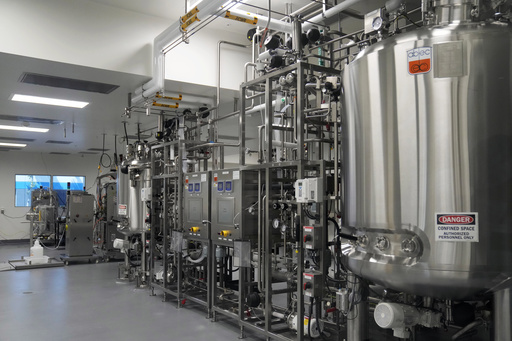LINCOLN, Nebraska — In a state renowned for its beef production, discussions surrounding a potential ban on lab-grown meat have sparked significant debate. Surprisingly, some of the most vocal opponents of this proposal come from within the agricultural community itself, with many ranchers and farming organizations asserting that they are capable of thriving independently, without governmental intervention.
Governor Jim Pillen, a significant figure in pork production, champions the initiative to outlaw cultivated meat in order to safeguard the interests of ranchers and traditional meat producers. Last August, the Republican governor enacted an executive order to prevent state agencies and contractors from acquiring lab-fabricated meat, despite the fact that it may take years before such products appear in retail outlets.
While the governor’s plan has garnered support, many ranchers and meat industry representatives are standing against it. For example, Dan Morgan, a lineage cattle rancher from central Nebraska who provides premium beef to a national and international clientele, emphasizes his willingness to welcome competition from new lab-grown meat enterprises. He views free market competition as fundamental, especially in a state that leans Republican. Morgan argues that rather than suppress innovation, the government should focus on establishing regulations around labeling and food safety for these novel products. “Ultimately, it should be left to consumers to decide what they choose to purchase and consume,” he commented.
Nebraska is among approximately twelve states considering measures to prohibit the production and distribution of lab-grown meat, as indicated by a recent analysis utilizing the bill-tracking software Plural. Such bans have already been enacted in Alabama and Florida, reflecting a growing trend on this issue.
The legislation specifically targets “cell-cultivated” meat, which is produced from animal cells in bioreactors. This process involves nurturing the cells in nutrient-rich environments, enabling them to grow and form muscle, fat, and connective tissues. Despite the growing number of companies involved in lab-grown meat development, only two businesses — Upside Foods and Good Meat — have been authorized by federal regulators to sell cultivated chicken in the United States. However, these companies are not yet in a position to mass-produce or distribute their products.
Recent discussions among Nebraska bill advocates have shifted focus from protecting the local industry to raising safety concerns regarding cell-cultured meat. This sentiment has been echoed by state Senator Barry DeKay, a rancher himself, and Sherry Vinton, the Nebraska Department of Agriculture director. Both voiced concerns in the recent committee hearings, labeling cultured meat as “synthetic food” and indicating potential health risks associated with its consumption.
Nevertheless, the underlying motivation for proposing a ban appears to significantly revolve around protecting Nebraska’s longstanding meat industry. The state’s leading status in beef production and exports is reinforced by the Nebraska Department of Agriculture’s data. During his recent State of the State address, Pillen underscored the ban as one of his administration’s top endeavors, asserting that proponents of lab-grown meat share common ground with those who oppose traditional farming practices.
Contrarily, the Association for Meat, Poultry and Seafood Innovation, which represents the nascent cultured meat sector, contests the notion that lab-grown products pose a risk to traditional meat producers. Citing studies predicting a doubling in global meat demand by 2050, executive director Suzi Gerber highlighted that cultivated meat could serve as a complementary avenue rather than a competitive threat.
Several agricultural associations, including the Nebraska Farm Bureau, Nebraska Cattlemen, and Nebraska Pork Producers, echo a sentiment of confidence regarding competition from this emerging sector. They favor an alternative approach that emphasizes strict labeling for lab-grown meats to distinguish them from conventional options. States like Colorado have witnessed similar shifts from outright bans to nuanced labeling measures.
Paul Sherman, an attorney with the Institute for Justice representing Upside Foods in its challenge against the Florida ban, notes that the majority of these proposed prohibitions are strongly supported by entities tied to traditional agricultural interests. Sherman posits that the motivation behind these laws encompasses economic protectionism rather than genuine public health considerations, stating, “It’s about shielding traditional agriculture from market competition, which is not an appropriate use of government authority.”




